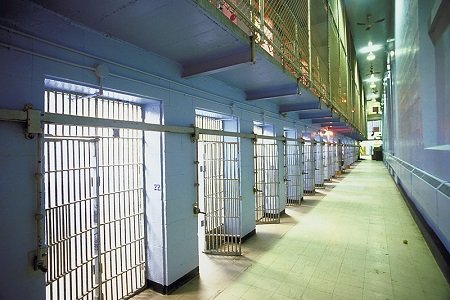(CNN) — Columbia University has become the first college in the United States to divest from private prison companies, following a student activist campaign.
The decision means the Ivy League school — which boasts a roughly $9 billion endowment — will sell its estimated 220,000 shares in G4S, the world’s largest private security firm, as well its shares in the Corrections Corporation of America (CCA), the largest private prison company in the United states.
The campaign began in early 2014, when a small group of Columbia students discovered the school was investing in the two firms, which run prisons, detention centers, and militarized borders.
The group, called Columbia Prison Divest, launched protests and meetings with administrators, arguing it was wrong for the elite school to invest in a “racist, violent system.”
“The private prison model is hinged on maximizing incarceration to generate profit — they’re incentivized by convicting, sentencing, and keeping people in prison for longer and longer times,” Dunni Oduyemi, a 20-year-old organizer, told CNN.
“We don’t think about how the privileges and resources students get access to are premised upon violence done to people by virtue of their race, class, or citizenship status.”
In an emailed statement, a Columbia spokesperson said the university’s trustees had decided to divest from private prison companies and would refrain from investing in such companies again.
“This action occurs within the larger, ongoing discussion of the issue of mass incarceration that concerns citizens from across the ideological spectrum,” the statement said. “The decision follows … thoughtful analysis and deliberation by our faculty, students, and alumni.”
The spokesperson would not confirm how much Columbia had invested in the two companies.
In 2007, Farallon, a company managing part of Yale University’s endowment, also divested from CCA after a student campaign, though it did not rule out future investment in prison stock.
History of controversy
Oduyemi said activists targeted CCA for its “horrific” human rights record. A 2014 ACLU investigation found abuse and neglect in CCA-run prisons where guards used “extreme isolation arbitrarily and abusively,” exposed prisoners to contaminated water, and delayed medical care of inmates, causing “needless suffering.”
Jonathan Burns, a CCA spokesman, defended the firm’s conduct.
“Our company helps keep communities safe and enrolls thousands of inmates every year in reentry programs that reduce recidivism,” he wrote in an email to CNN.
“It’s unfortunate that activists would advocate against those benefits without themselves providing any solutions to the serious challenges our corrections systems face.”
Student activists also targeted G4S, a British firm, which has supplied a prison in the West Bank and checkpoints in Palestinian territories. Until last year, the firm also had a contract to provide services at U.S. detention facilities in Guantanamo Bay, according to the Financial Times. The firm still maintains patrols along the U.S.-Mexico border.
South African prisoners have sued the firm over claims they were tortured, according to the Guardian.
A spokesman for G4S, Nigel Fairbrass, said the accusations were groundless.
“We actively followed up with the South African government and have been presented with no evidence to substantiate the allegations,” Fairbrass told CNN in an email. “The prison was also returned to our operational control last year.”
He added that a 17-month investigation by the OECD’s United Kingdom contact point had not found any human rights violations in G4S’s operations in Israel — and said the company would not renew its contracts in Israel once contracts there expired over the next two years.
Will divestment have an impact?
Oduyemi said G4S had been responsive to past divestment campaigns, and “that has been the only effective way of getting them to change the contracts they write.”
But Fairbrass said Columbia’s holdings of G4S stock, around 220,000 shares, comprised just 0.015% of G4S’ market cap, valued today at $4.35 billion.
Similarly, CCA has a market cap of $4.01 billion. Both firms are highly profitable and continue to grow.
Alex Friedmann, the managing editor of Prison Legal News, a project of the nonprofit Human Rights Defense Center, predicted the divestment would have little to no effect on companies’ stock price or operations.
“I don’t see divestment campaigns making a big dent,” he told CNN. “They serve more as public education on private prisons, organizing tools, or as social commentary on what people believe is acceptable to be investing in.
“As long as prison companies have the bed space the government needs and wants, they will most likely stay in business.”
Although Columbia is the first U.S. university to announce divestment from private prisons, similar campaigns are ongoing at other institutions, including Cornell, Brown, U.C. Berkeley, and UCLA.
“It seems to be a moment where people are making the connection between all the kinds of uprisings we’re seeing right now — #BlackLivesMatter, mass incarceration, and university movements,” said Oduyemi. “We all recognize how much work has to be done in the future.”
